Monsoons can be a particularly trying time in Kolkata, but for the Maidan, the vast green expanse in the heart of the city, it is an indisputable blessing. Home to about 40 cricket and football clubs, the nearly three months of rain is the only time when the grounds get time to recover from the stomping it receives the rest of the year. The players are on leave, the clubs empty out, and the only people active are the groundskeepers. Yet, on this cloudy July morning, there is one player oblivious to the conditions.
At Kalighat Club, Wriddhiman Saha is rolling the pitch himself. He’s just finished trimming it with a lawnmower. The groundskeeper had offered his services, but Saha wanted to do it himself, do it just right.
He can’t afford not to practice—India A’s West Indies tour is just days away, and it could lead to a call-up—yet again—to the Indian Test squad.
Saha inspects the pitch, and is pleased with his handiwork.
“I’m trying to begin again from where I first began,” he mumbles under his breath.
“My friends have seen those”
It has been an eventful few months for Saha since that day at the Maidan. He was sharp as ever on the India A tour. He got picked for the Indian Test squad for the three-Test series at home against South Africa, and was effusively praised by his captain Virat Kohli as “the best wicketkeeper in the world”. He took spectacular diving catches, was clockwork behind the stumps at all other times, and worked in pitch perfect harmony with the spinners.
“Following the ball till the last moment, soft hands and rising with the ball are my three priorities, be it any format,” he says over the phone, as if explaining the simplest thing in the world. It’s not. What it is, is an outstanding level of skill and competence acquired over years of single-minded focus. It is years of playing on unkempt Maidan grounds, often on matting wickets with unpredictable and nasty bounce, honing reflexes of a lifetime. It is an uncluttered mind that revels in drudgery.
“All I wanted was to be a wicketkeeper,” Saha says.
That’s exactly what he became, and for Saha, that’s all that matters. Not that he had to play second fiddle to MS Dhoni for most of his career. Not that at 35, he is almost at the end of his career and still has to wait for his chances to play for India despite being, inarguably, the finest gloveman around. What matters is that he keeps wicket for Kalighat Club, for Bengal, for Sunrisers Hyderabad. What matters is that he’s kept wicket for Mohun Bagan Athletic Club, for Kolkata Knight Riders, for Kings XI Punjab, and even for Chennai Super Kings, where Dhoni is king.
During the second Test in the South Africa series in Pune last month, Saha took yet another flyer, reacting at lightning speed and leaping to his left to take a catch down the leg of Theunis de Bruyn.
Kohli made it a point to state again that Saha is the best keeper in the world. For Saha himself, it was not even one of the best catches he has taken in his career, but just another day doing what he loves to do.
“There are far better catches that haven’t been recorded, club matches or for that matter in Ranji Trophy,” he says. “My friends have seen those.”
That is not to say that he’s not enjoying his recall to the Indian squad after 18 months of injury-ridden uncertainty, where he missed out on crucial tours of England and Australia and saw the explosive rise of Rishabh Pant as India’s wicketkeeper across formats. Those 18 months had come after Saha had finally cemented his place in the Test squad after Dhoni’s retirement from the format in 2016. For two years, he had played his heart out. He scored a sensational century in difficult circumstances against Australia in 2017. He took ten catches in a single Test against South Africa in 2018. And then he was injured.
So when another chance came, he grabbed it with both hands, then with one hand, on both sides of the stumps off the same batsman—poor Theunis de Bruyne—on consecutive days. As South Africa was rolled over in all three matches, a specialist wicketkeeper finally got his moment of fame.
“It was a good catch,” says Saha. “And this is definitely a great phase. I really appreciate whatever Virat has said about me. I made a comeback, we won the series 3-0 and now I’m expecting a second child (due next year).”
Yet he sounds as laidback and low-key, as soft-spoken and reticent as he has always been.
“I have always been like this. I don’t talk much. I don’t interfere in what others are saying or doing,” he says. “Even if it’s a domestic match, I go, keep wickets, bat and return. I don’t really concern myself with things happening around me. I just do my job.”
The accidental keeper
The ‘job’—Saha will always be wicketkeeper first, batsman later.
“I gave more time to wicketkeeping than batting,” he says.
It’s a risk no one wants to take now. The concept of a specialist wicketkeeper is tricky—they are not expected to survive if they can’t bat. Then why not focus on something that gives tangible returns? But this isn’t a straightforward argument. To Saha, it’s a matter of choice. “Since I was a kid, I wanted to be different. I never had a herd mentality. I love the underdog. If he wins, I will be happy.”
He didn’t start as a wicketkeeper though.
“There was a camp near my house (in Siliguri). And since my father played, he took me there. There were four-five wicketkeepers but one day none of them showed up,” he recalls. “Someone had to catch the ball because there was a wall behind the practice ground. That is when I was drafted in. It turned out rather well, I caught a few balls. I enjoyed that. My father said ‘Let’s see if you enjoy this a little more. Then I will get you proper gloves’. I was 12 then.”
(His Test debut in 2010 was accidental too—he was the reserve wicketkeeper, but was given his cap not because the first-choice keeper was injured, but because first, VVS Laxman did not recover from an injury he was expected to recover from, and then, the only reserve batsman, Rohit Sharma, injured himself playing football on the morning of the Test.)
At 12 Saha joined Agragami, the Siliguri club where his father Prasanta was once a wicketkeeper. Jayanta Bhowmick, Saha’s coach at Agragami, has vivid memories of the day he came to the club with his father.
“Since the first day he was someone who would speak less and do more. That was always his attitude,” Bhowmick says from Siliguri. “And it hasn’t changed. He used to listen to everything minutely. And he never took the shortcut. But it’s really about the genes, you know. His father is the real reason why Wriddhiman is such a natural, classical wicketkeeper.”
Saha’s father started out as a goalkeeper, and almost made it to first division football in Kolkata, back then, the pinnacle for any Indian footballer
“He was a brilliant goalkeeper. Then, it was rare for a Siliguri boy to get a chance in a Kolkata team. But he never got to play for real. There were many reasons, financial or some other,” says Bhowmick. “So he started playing for our club (Agragami) in the league. He was the automatic wicketkeeper because he was a goalkeeper. He never required any wicketkeeping manual. Superb fitness, brilliant reflexes. Wriddhi inherited all that.”
Saha’s training set off on the usual lines, attending winter camps and learning the nuances from TV.
“I used to look up to Adam Gilchrist and Ian Healy,” Saha says. “Also Mark Boucher. Our coach taught us the basics of wicketkeeping but I learnt the nuances watching cricket on TV.”
Soon he was sent to Kolkata to try out his luck in age-group and club cricket. He was spotted almost immediately.
“I was CAB secretary when he was playing under-16 and under-19,” says Bablu Koley, a former Cricket Association of Bengal (CAB) secretary and treasurer and one of the chief patrons of Kalighat Club, one of the biggest cricket clubs in the city. “During an under-19 match, Kiran More told me ‘keep an eye on the boy, he is a natural keeper, don’t mess with his technique’.”
“I never played second division,” says Saha (Kolkata club cricket has two divisions). “My first club was Kumartuli. The first season I got to play six matches since there were two keepers and matches had to be shared. I batted at No 10. That is how I started. Customs Club, Shyambazar and so on, I made quite a few rounds of quite a few clubs. But I stayed at Koley market from the first day.”
A bit inhuman
A few hundred metres from the chaos of Sealdah station, Koley market is one of Kolkata’s main wholesale markets for vegetables. Above the colourful anarchy of hundreds of vegetable sellers, thousands of shoppers, and gigantic piles of vegetables of every variety, shape, size, and hue imaginable is an old, dilapidated, multi-storeyed behemoth where cricketers, footballers, and athletes from many other disciplines rent rooms. Some aspiring athletes are too poor to pay. No matter, they still find a bed.
“Wriddhiman came to Kolkata around 1999 or 2000,” says the building’s caretaker Rinke Sole, who is the same age as Saha, and began working at the building when he was just ten years old. “He considers this place lucky. Every time he returns from a tour, he comes here to have tea with me. He remains a simple, grounded man, not a shred different than the boy I had seen come to Koley market 20 years ago.”
It was while staying at Koley market that all the big breaks came Saha’s way—his first Bengal match, first India A call-up, first IPL contract. The success made no difference to his lifestyle. Every day at the Koley market mess on the top floor of the building, Saha ate his meals, sharing tables with labourers, porters and market vendors.
“Koley market to Maidan and vice-versa, that was his routine,” says Sole.
It was also while staying at Koley market that Saha met his wife Romi. Social media had just made its first appearance in the form of the now-defunct Orkut. Messages were exchanged, profiles were checked, and a date was fixed.
“I was very disappointed,” recalls Romi. “He didn’t even pay. I was shocked.”
Romi would find out that this was just the way Saha is.
“We were in a relationship for four years before we got married but he never bought me anything from his tours,” she says. “He doesn’t get anything even now to be honest.”
“I once went to the mall wearing sandals and a tee,” says Saha. “My wife was shopping and I was standing near the billing counter. I could overhear one of the salesmen saying ‘Look, Wriddhiman’s come’. To that, his colleague said ‘impossible, why will he come in sandals?’ I overheard everything but didn’t react. People may think a cricketer always has to be well-dressed or be a style icon, but it doesn’t come to me easily.”
“He keeps saying ‘I can only do one thing in life. And that’s playing cricket,’” Romi says. “He said the same thing to me when we got married. ‘Don’t expect me to do anything.’
“I had to adjust. I had to go to the doctor alone when I was pregnant, because he was playing for Mohun Bagan. I realised there is no point telling him. Mentally he is very strong. I suppose it’s a good trait, as a player, to be strong emotionally. But personally, it’s a bit inhuman.”
Hard hitter
While it hasn’t always been apparent on the international stage, Saha is an aggressive batsman who enjoys playing all three formats. He was the first batsman to score a century in an IPL final. And despite his deep focus on wicketkeeping, he has always had ambitions with the bat.
“Now, many kids say ‘I want to play for India’,” Saha says. “In my case, when I was playing under-19 through to under-22, I knew I could go forward if I did well there. It wasn’t only about playing for India, but just to play at a bigger level.”
The opportunity came soon enough when Deep Dasgupta, the Bengal captain and wicketkeeper, left for the rebel Indian Cricket League in 2007, vacating the keeper’s slot.
“He started shadowing in his room,” says Sole, recalling those days at the Koley market building. “He always set himself targets. It was only his first Ranji year but he wrote in his diary ‘I have to score four centuries’.” Saha scored one on debut, against Hyderabad at Eden Gardens.
The Saha you see in Tests is a mellower version of the one people know from the club matches in Bengal. The one who, last year, scored a 20-ball 102 (14 sixes, 4 fours) for Mohun Bagan in a local T20 tournament (at the Kalighat Club ground, which is a reasonably sized field). Look up his domestic career and there are astonishing innings at important junctures.
Like the unbeaten 272-ball 203 in the second innings of the 2017 Irani Cup to help Rest of India chase down an improbable 379-run target. Like the 2013-14 Ranji Trophy when Bengal’s dreams of reaching the final were dashed by Maharashtra seamer Samad Fallah’s seven-wicket haul in Indore; staring at a massive loss, Saha came out in the second innings with the sole intention of hurting Maharashtra. Wickets kept tumbling at the other end, but he kept swinging his bat till he was not out on 108. No other Bengal batsman had scored even a fifty in either innings. “We knew we would lose. What’s the point of staying around? I just wanted to hit out, make a point,” says Saha. “When I go to bat, I don’t think about myself. Even my coach says I should focus on myself before I think about the team. Somehow I can’t do it. I don’t think I have that inside me. Whenever I go, if I’m required to hit, I will hit. Doesn’t matter if it is my comeback match. I don’t think about myself or who is breathing over my shoulders.”
Kohli would remember. Back in 2016, in pursuit of his first Test series win outside Asia, Kohli saw West Indies gain an early hand in the third Test in St Lucia, with the series 1-0 in India’s favour. India were 126/5 in the first innings when Saha walked in. When he was finally dismissed, India were 339 after Saha and R Ashwin added 113 for the sixth wicket. That was his debut century. India won the Test to take an unassailable 2-0 lead. Two months later at home, Saha eked out two fighting fifties at Eden Gardens against New Zealand on a sportingly lively pitch. And then came the battling 117 against Australia trying to save the Ranchi Test on a tricky surface.
“The fifties against New Zealand were definitely vital. We had a good batting order but someone had to play the supporting role,” Saha says. “The pitch wasn’t easy. I don’t think New Zealand expected a pitch like Eden, something they normally get at home. It was seaming a lot. That’s my best effort. St Lucia and Ranchi come after that. Australia were very good in Ranchi. We were chasing a big total. All we wanted was a big partnership. They were sledging. And we were giving them back a few. So it was getting very tense.”
His career average is 30 but it’s in the last three years where Saha has made a real mark on the team, after being consistently picked in the absence of Dhoni.
In this period, he averages 36.60, with three hundreds and three fifties. Now, he has a chance to build on that. At 35, Saha is as fit as ever—a wiry, well-muscled athlete as obsessed with his fitness regime as Kohli is.
What does he think his legacy will be?
Saha smiles.
“No idea,” he says. “My wife thinks more than me. All I know is that I have to be fit to play the Indore Test.”

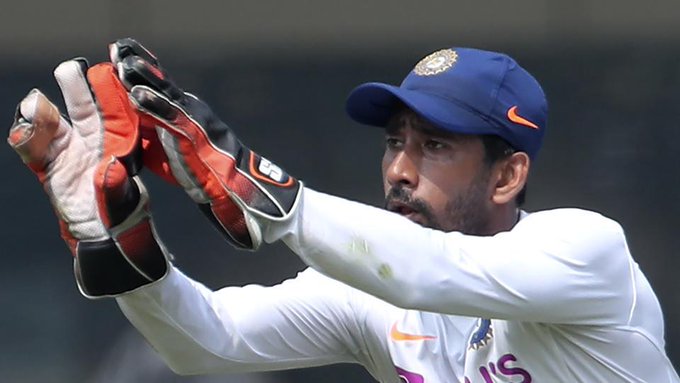


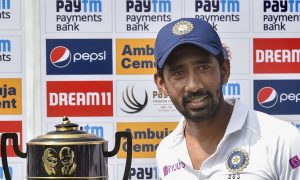



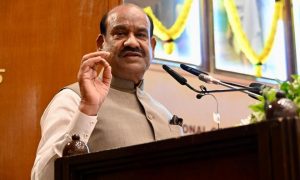



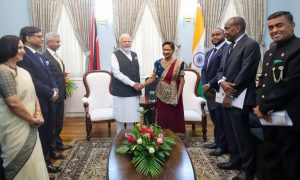

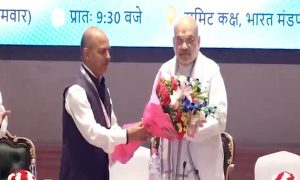







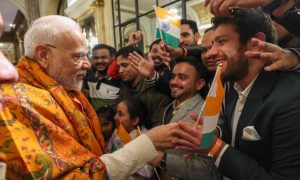

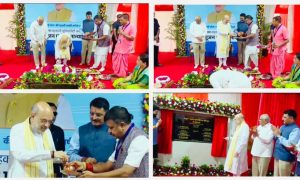



 WhatsApp us
WhatsApp us